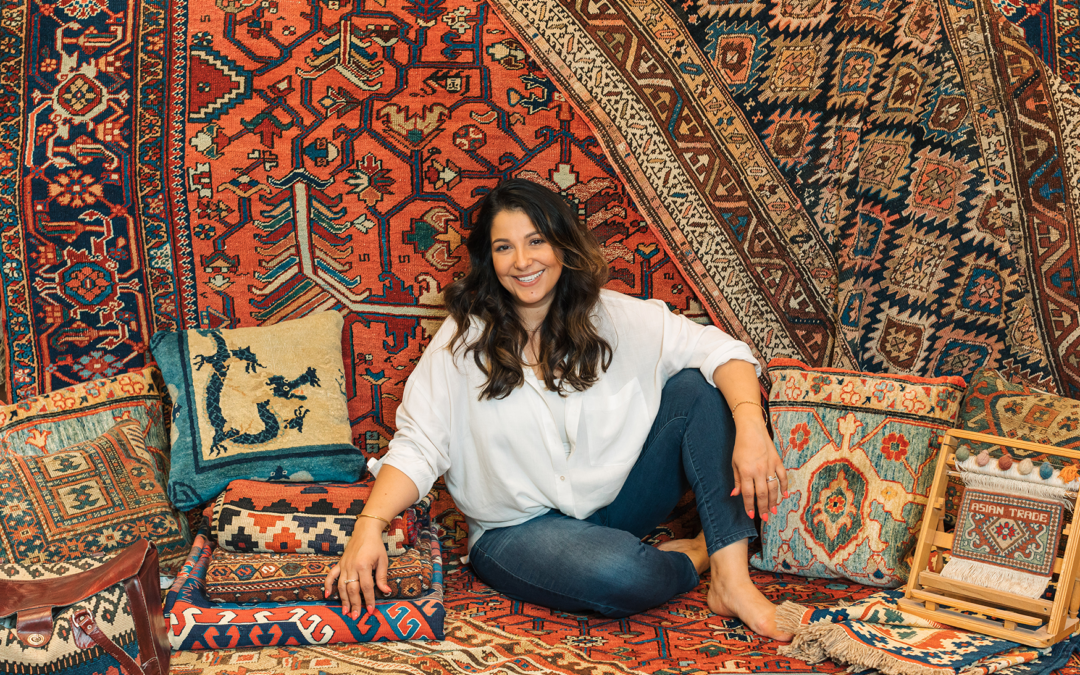Weaving a Tradition
In Tucson, Asian Trade Rug Company celebrates 45 years in business and four generations of rug expertise.
By Nora Burba Trulsson
Photography courtesy of Asian Trade Rug Company
Hanging behind Hannah Massarat’s desk is a 19th-century Persian Tabriz rug. As a fourth-generation Persian rug dealer, Massarat’s wall decor serves as a reminder of her family’s roots in Iran, of their immigrant story and of the blossoming of the family business—Asian Trade Rug Company—in Tucson.
“The rug business is not like others,” Massarat says. “It’s about your family, who you know, and is deeply ingrained in connections.”
Massarat is relatively new in running the family rug company. She’s an interior designer, who studied at UA and ASU, working on projects such as healthcare, office and retail while at Davis in Tempe. “Taking over the family business was always at the back of my mind,” she explains, “but when COVID hit, my husband and I decided to move to Tucson to be closer to family.”
Asian Trade Rug Company was founded in 1978 by her father, Kasra Massarat, and his business partner, Tomas Almazan, both of whom are still involved in the business. They started out small, in a shop on Fort Lowell Road, then built their own store on Prince Road and Campbell Avenue. Some 20 years ago, they moved to their current location, a midcentury compound at the edge of the Sam Hughes neighborhood, with a 4,000-square-foot showroom and another 4,000-square foot space devoted to the rug cleaning and repair side of the business. Coincidentally, Hannah Massarat notes, the building was constructed in the 1960s by an Armenian couple for their own rug business, which has since ceased operations, and features a structurally over-
engineered roof, meant to entice a Tucson location for the Playboy Club—a move that never happened.
With 15 employees, Asian Trade Rug Company stocks some 4,000 rugs, ranging from new contemporary and traditional patterns, to vintage pieces and antiques. Additionally, the showroom floor is dotted with pillows and upholstered pieces made from rug remnants. The company also buys rugs from customers, sells on consignment and welcomes trade-in, as well as handles cleaning and repairs.
Massarat says she and her father have traveled the world seeking out rug-makers who weave and hand-knot rugs by hand, in places like Afghanistan, Pakistan, Turkey, Nepal and India. COVID and the winds of politics and war often determine where they can and cannot buy, a shifting landscape that has given rise to events like a large annual rug show in Hanover, Germany that Massarat attended earlier this year, and the option for online buying. “We only buy some of our stock online from trusted partners,” Massarat explains. “This is still very much a hands-on, tactile and visual business.”
The rug company has also become the go-to source for Gabbeh rugs, tribal rugs crafted by nomads in the Zagros Mountains of Iran. Done in simple, primitive patterns, the rugs are made from the wool of the nomads’ sheep and colored with vegetal dyes.
While Asian Trade Rug Company sells throughout the country, Massarat says traditional patterns and colors are most popular in the Tucson market. The company works hand-in-hand with the local design community, offering courtesy to the trade and supplying product to Design Icons like Linda Robinson and Lori Carroll. Massarat says the business is an ASID Industry Partner and has hosted a mixer for IIDA, a nod to her past life as a member of that organization. Allowing customers—both retail and design professionals—the option of an in-home trial for a day or two is another way of guaranteeing customer satisfaction, she says.
With Massarat’s guidance, the company has given back to the community, cleaning, repairing and donating rugs to nonprofits like Habitat for Humanity. “I just
hate seeing rugs going into landfills,” she says. The company has also loaned rugs as set decor for plays and concerts, including a Rondstadt family concert at a historic Tucson theater. Event planners also go to the company to rent rugs for weddings and other gatherings.
One part of the business Massarat is expanding is cleaning and restoration of rugs, taking in orders not just from retail customers but on a wholesale level from rug companies and dry cleaning establishments throughout Arizona. “Worn or damaged, these rugs are made from natural materials and can almost always be cleaned and restored,” Massarat says. “One customer recently brought in some family rugs damaged during Hurricane Katrina. “When we can help, those moments are special.”
Special, too, is the longevity of Asian Trade Rug Company, where today the children and grandchildren of original customers come for their own rug needs. “We have been here for 45 years,” Massarat points out. “We didn’t even close during COVID. There are no rug stores in town that have been in business as long as we have.”

